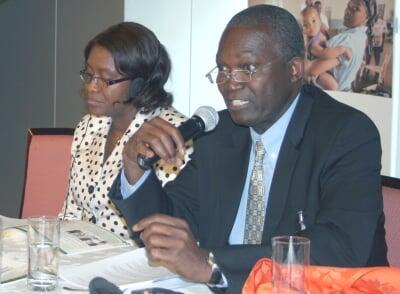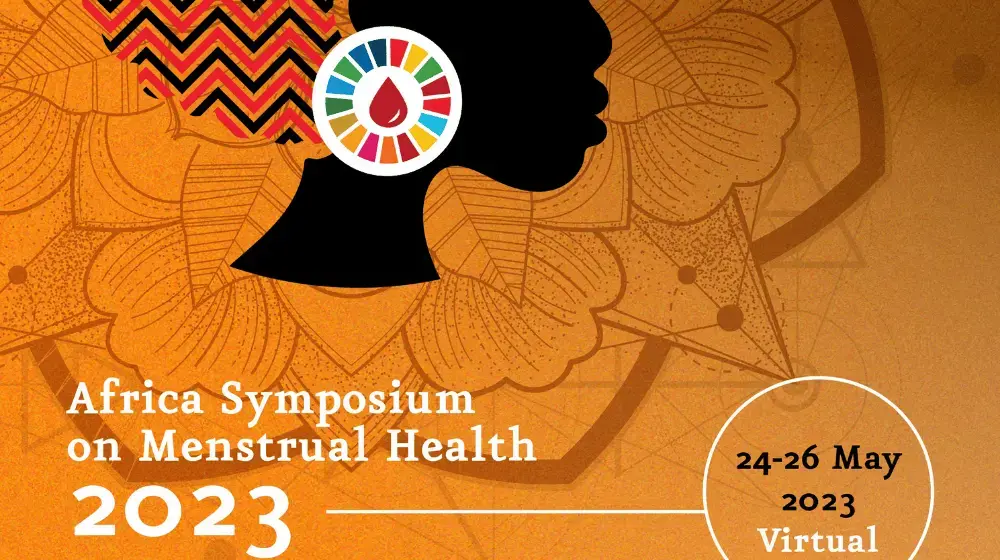The issue of maternal health featured strongly at the 6th African Union Conference of Ministers of Health (CAMH6) in Addis Ababa, Ethiopia from 22-26 April, thanks to a concerted effort by the United Nations Population Fund, UNFPA.
This included a highly successful working lunch on the Campaign on Accelerated Reduction of Maternal Mortality (CARMMA), at which African Ministers of Health and health experts vowed to intensify efforts to improve maternal and newborn health on the continent in the framework of CARMMA.
The event was an occasion to push for the inclusion of CARMMA and related issues in the draft report and recommendations of the Ministers, which will be submitted for discussion at the AU Assembly next month, to be held in connection with the AU's 50th anniversary.
The health ministers and experts discussing issues contained in the communiqué that came out of the CARMMA High Level Event at the AU Summit on 27 January this year. They highlighted the need to garner more support and mobilize domestic financial and material resources to take the effort forward. An agreement was also reached on replicating good practices in the reduction of maternal mortality and building partnership with a multi-sectoral focus.
Bunmi Makinwa, UNFPA Regional Director for East and Southern Africa, urged the Ministers of Health to continue the momentum of CARMMA and support the leadership of the AUC and Heads of State and Government.
“Universal access to family planning can reduce maternal deaths by as much as 30 per cent,” he said. “Family planning enables people to protect themselves against sexually transmitted infections (STIs, including HIV) and unwanted pregnancies, to plan the number of children they want, and to space the births. But it is not yet available to everyone who wants to access it.”
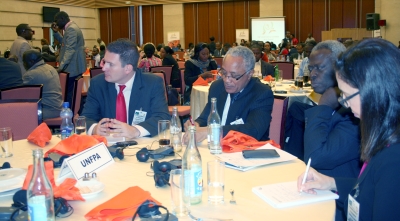
He stressed that African countries need to take steps to strengthen efforts to save the lives of Africa’s women and girls:
- Increase their personal commitment, including mobilizing the entire country and promoting everyone’s involvement to improve the health of mothers and children, making maternal health a top priority;
- Increase and ensure better use of domestic resources for maternal health. This includes thinking about creative and innovative financing and public private partnerships; and
- Empower their ministries of health to intensify, share and replicate good maternal health interventions and involve other health related sectors.
He said that more work needs to be done in light of the fact that 452 women continue to die each day from pregnancy-related complications. "UNFPA, on behalf of the UN collective, will continue to support and work with the African Union Commission’s Department of Social Affairs to monitor the progress of CARMMA and other maternal health interventions, as recommended at the July 2010 AU Summit in Kampala, and report on them,” Mr. Makinwa said. “In the same vein, we shall strengthen and improve technical support with countries for increased financial, human and material resources for Sexual and Reproductive Health, and Maternal Health.”
Ambassador Olawale Maiyegun, Director of Social Affairs with the African Union Commission, said that the health of mothers and their children continued to be a priority for the leadership in Africa as it provided a firm indication of development and the overall quality of life of citizens on the continent. “Without effective implementation of a comprehensive sexual and reproductive health strategy, one in which women have control over their bodies and the means for this, the overall vision of CARMMA will remain unattained,” he added.
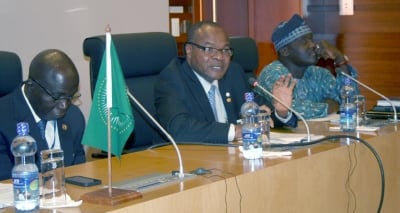
At the lunch, the delegates agreed on the contents of the communiqué and how to take it forward. The document, which was fully endorsed by the Ministers of Health, is to be submitted for further endorsement at the highest level at the Special Summit on Abuja +12 from July 15-19.
The working lunch on CARMMA was organized jointly by the United Nations Population Fund, UNFPA, and the African Union on the second day of CAMH6, the theme of which was non-communicable diseases (NCDs) and neglected tropical diseases (NTDs).
CARMMA is an African Union Commission initiative to promote and advocate for renewed and intensified implementation of the Maputo Plan of Action for the Reduction of Maternal Mortality in Africa and to accelerate progress towards Millennium Development Goal 5 – improving maternal health. Since the start of the campaign in 2009, a total of 38 countries have launched the campaign to date. These countries have also pledged to improve maternal health through their commitments to the United Nations Secretary General’s Global Strategy on Women’s and Children’s Health. Up to 10 more countries across the continent are expected to launch CARMMA in the course of this year.
The meeting also dealt with a number of development issues, particularly maternal health and mortality, Africa’s demographic dividend, and communicable diseases such as HIV and AIDS.
The conference began with an experts’ meeting to review the draft Annual Maternal, Newborn and Child Health (MNCH) Status Report. The conference saw the production of a Good Practice report produced by the AU and the Maternal Death Audit Report, and included discussions on the matter of the health MDGs beyond 2015.
UN Women organized a side event which focused on maternal health and CARMMA. The first day of the meeting and the closing session were chaired by UNFPA's Reproductive and Maternal Health Technical Adviser, Dr. Akinyele Dairo.
At the meeting, the African Union Commission called for more domestic investment in health, at a time when the continent was confronted by neglected tropical diseases (NTDs) and an increasing burden of non-communicable diseases (NCDs). In addressing the AU Ministers of Health, the AUC Commissioner for Social Affairs Dr. Mustapha Sidiki Kaloko said that health deserved funding because it was an investment in economic development.
CAMH6 ended with the ministers' adoption of a declaration on the impact of non-communicable diseases and neglected tropical diseases on development in Africa.
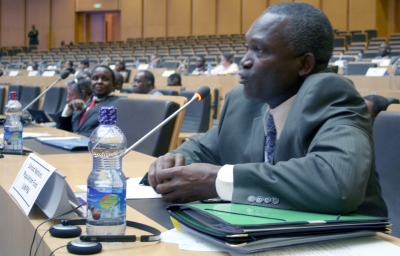
A number of important events are planned for the coming months. They include the 4th China Africa Round Table, organized by the Governments of China and Botswana in collaboration with development partners working on health, including UNFPA, in Gaborone, Botswana, from 6-7 May; the Tokyo International Conference on Africa’s Development (TICAD), organized jointly by the Government of Japan and the African Union, in Tokyo from 1-3 June; the International Conference of Maternal and Newborn Child Health (MNCH) on improving maternal, neonatal and child health in Johannesburg from 1-3 August; the Abuja +12 Special Summit of AU Heads of State and Government, from 15-19 July; and in 2015, the 7th Ordinary Session of the Conference of AU Ministers of Health (CAMH7) will be held in Senegal.
~ Lindsay Barnes and Abraham Gelaw

